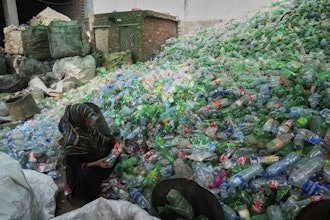
Nearly one-quarter of Americans admit to “always” or “often” throwing away their reusable items such as bags, food containers, and water bottles. That’s in response to a survey of 2,000 adults, conducted by OnePoll on behalf of Stasher.
Over the last year, respondents purchased 14 boxes of plastic bags, 11 plastic cups, nine single-use silverware packs, 17 paper towel packages, and 15 paper plates — totaling 65 disposable purchases.
Nearly three in five Americans say they take their sustainability efforts more seriously today than they did five years ago, while 41% admit that using disposable products makes them feel guilty about harming the environment.
Many say they reuse plastic bags, plastic water bottles, takeout containers, and even their single-use utensils. The survey also reveals that Americans invest in sustainable products, though their efforts may be counterintuitive.
The Conscious Effort
The average United States citizen owns 51 reusable items in their home, but they admit that they use less than half (45%) of these items on a regular basis. These items include three water bottles and thermoses, three plastic or metal straws, and five plastic bag alternatives. That’s not even counting their six food storage containers, five reusable shopping bags, and various other miscellaneous items.
In fact, the average American has bought $54 of new reusable equipment just in the past year. 21% say they’ve spent more than $90 in that time.
“I make it a point to purchase glass food storage containers,” explains Tiffany McCauley of Slappy Toad. “They last forever, so no need to constantly replace them, and they cut down on plastics in our landfills. It’s a small thing, but little things add up over time.”
Does everyone buy these items to be more eco-friendly? For 45%, it’s because they wanted a variety of sizes. One quarter admit they needed an alternative in case they can’t use their favorite item. Others seem to be jumping on the bandwagon, as 19% are opting for a variety of colors. Just under 10% say they purchased items because they’re trendy.
While many still see the term “sustainable” as saving the planet, others see it as a marketing technique, another trend, or even a status symbol.
“It’s refreshing to see that more than half of those surveyed (59%) are taking their sustainability efforts more seriously than five years ago,” says Hilary McGuigan, the Vice President of Marketing at Stasher. “It’s an encouraging sign that people feel empowered to make changes in their own lives and have the agency to reduce their reliance on plastic waste and other single-use items. However, results found that there’s work to be done for their friends, family, and businesses, as just 14% believe they’re taking their efforts ‘much more seriously.’”
Corporation Consumption
The survey also reveals 73% of respondents believe that corporations have a duty to protect the environment.
Almost one in five admit they’ve gone so far as to “cancel” a brand for their non-eco-friendly practices. In fact, 12% of respondents believe sustainability factor is the most important factor when making a purchase.
One in five are willing to pay a higher price for something that’s sustainable. 23% say they’ll wait for longer shipping times to help protect the planet.
But while everyday Americans are consciously trying to change the world around them, the larger problems might be hiding in plain sight.
Since 1988, just 100 companies have been responsible for 71% of global greenhouse gas emissions.
Climate change impacts every corner of the planet, as heat waves, melting glaciers, and sea levels continue to rise due to the rising temperatures caused by global warming, according to NASA.
Nearly half asked say they experience the effects of climate change firsthand. Of the 20% who don’t make that claim, a quarter believe they likely will within their lifetimes. Nearly two-thirds of respondents agree we should focus on the Earth more than just one month a year.
“Nearly half (49%) of survey respondents remain unswayed to make a sustainable purchase based on a company’s Earth Month sales,” says Clayton Wiley, Vice President of Sales at Stasher. “Which is all the more reason as to why we should collectively celebrate the Earth every day and make choices that are better for the planet beyond April.”
The United Nations suggests people bike or walk instead of driving when they can, use less electricity at home, clean up your neighborhood, and always speak up for climate justice. While climate change can seem overwhelming and scary, small actions from everyday people protect the world we live in.





















